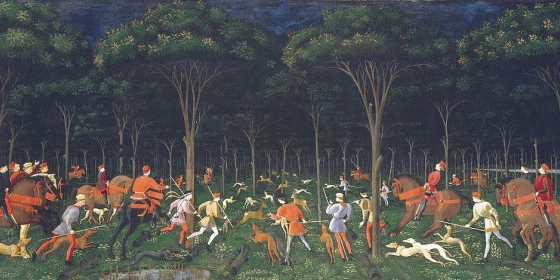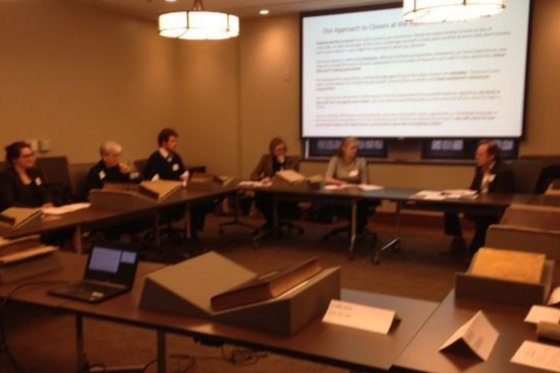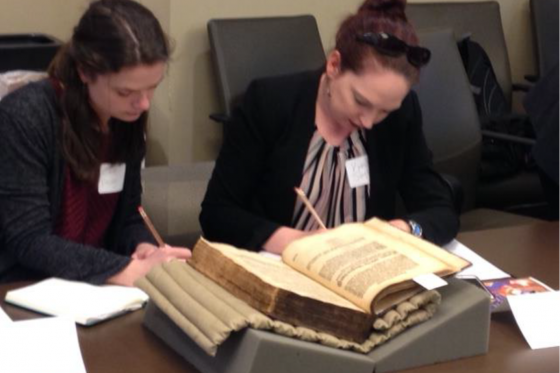Further On ... from Pedagogy and the Premodern: A Symposium
Further On . . . from
Pedagogy and the Premodern: A Symposium
Duke University, March 6–7, 2020
What happened
On Friday, March 6th, and Saturday, March 7th, Duke’s Center for Medieval and Renaissance Studies presented the symposium “Pedagogy and the Premodern.” Scholars of all different career stages and disciplines across America came together to discuss the particular rewards and challenges of teaching premodern material. Dr. Katie Little, professor of English at the University of Colorado at Boulder, gave the plenary address. See the entire program. Dr. Grace Hamman asked a few attendees of the symposium to share their biggest take-aways from this series of rich and collaborative presentations and conversations.
Going further: Reactions from some participants in “Pedagogy and the Premodern”
Dr. Jessica Ward, Mercy College
It’s clear that those in premodern fields are well positioned to engage with the challenges the humanities are facing in higher education today. From presentations about how to engage freshman and composition students with premodern texts and material artifacts to those aimed at creatively engaging with premodern materials and using them to speak about current issues, I feel well prepared to return to my institution with knowledge and ideas that will help me articulate and model the importance of the humanities to my students. The contemplative inquiry workshop gave me a framework for engaging students with texts that they might be resistant to, and it encouraged and modeled how I might use mindfulness techniques in my courses. These techniques are useful and essential to all instructors who teach today’s students, and I hope to share Dr. Kinane’s work with my colleagues at Mercy College and beyond. Perhaps the most important thing I took away from this symposium is that it is essential for scholars and educators across fields and institutions to collaborate to develop and innovate new pedagogical techniques and strategies.
Nicholas Smolenski, Duke University
It was illuminating to hear scholars encourage inclusivity and compassion when engaging with premodern sources. Interpreting marginalized voices as they relate to the modern world remains as crucial as the teaching of artists’ cultural contexts. Such voices, therefore, offer students of every discipline a way to resonate with premodern cultures in the classroom.
Dr. Amy Vines, University of North Carolina at Greensboro
A major take-away from the symposium—aside from the joy in seeing so many old friends and students!—was the awareness that we all share the same or similar challenges in teaching premodern material. In addition to hearing about wonderful assignments that I can’t wait to use in future classes, I’ve been introduced to many helpful ways to frame my classes more broadly, from the concept of “relatability” to the benefits and potential pitfalls of “emotional” reading.
Meghan Woolley, Duke University
I came out of the symposium with a toolkit of new student-centered ideas to try in future classes. More abstractly, in a time when stress about the place of the humanities in academia is high, I was left feeling inspired by the energy and creativity premodern scholars are bringing to their classes.
Dr. Will Revere, University of North Carolina at Asheville
I was inspired at the conference to slow down with the materials we teach—this might mean, as Karolyn Kinane said encouragingly in her workshop on contemplative pedagogy, teaching fewer things. In the face of our anxieties of “coverage,” that might be a hard pill to swallow, but it seems well worth it. The slowing might happen in how we teach reading and analysis, or in how we teach creative responses to our texts. Along these lines I thought there were wonderful ideas from conference presenters about everything from student-designed websites and book-making to inclass carpentry and makeshift class guilds for medieval drama. In a way, Katie Little’s keynote address, “Against Literariness,” confirmed some of these ideas about rethinking our professional lives in new times from the ground up, around the work we do as teachers. An engaging, inspiring time!
Dr. Katie Little, University of Colorado at Boulder
I found the symposium thought-provoking and what I would call restorative. I was struck by the immensely creative methods that symposium participants were using to encourage close attention to texts, by having students sketch what they heard, or note down their emotions as they read, or act out passages for each other. Many of the participants also approached their students’ lack of knowledge as generative, not as a gap that needed to be lamented and filled in, but as an impetus for conversation about the objectives of a specific course and about the reasons for learning about the medieval and early modern periods more generally. Perhaps most important to me was the sense of community; the symposium provided a space to reflect together on how much we have learned and continue to learn from each other.





